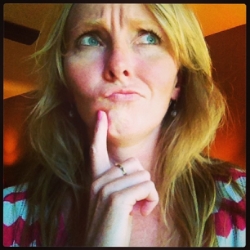“Girl, did you forget your meds this morning?” My friends and I joke about needing meds to keep us functioning, because we want to laugh the shame out of it. I joke with the ladies at the gift shop that I need Xanax to be calm enough to watch my 9 year old play catcher (those bats swing fast and hit hard), and the store erupts in laughter because they all get it. They probably all use it too, they just don’t talk about it publicly.

Truth is, the people in my life who are the healthiest, most well adjusted folks are either in counseling, getting meds or used a combination of both at some point in their life. These folks are real. They’ve accepted the fact that they are not equipped to meet all their own needs, solve all their problems and face their demons alone. They are ok admitting they need help, asking for it, and then accepting help in its various forms. These people are my people. These people know how to fail, make mistakes, be weak, fall apart, and then get back up and knock the hell out of their “diagnosis” by doing stuff that their “diagnosis” said they couldn’t do. They’ve learned to accept themselves as real, instead of ideal, and they’ve worked with what they got, even when what they got was not a lot, until they overcame each obstacle. They determined their “problem”, their “anxiety”, their “addiction” would not define them. They would define it. Period.
But not everyone in my life plays it like this.
There’s the people who should admit they need help, but won’t. They need to accept they have a problem that is affecting their family, their health, their job- but they won’t. These people are not my people. I love them, and even like them, but as far as getting close? I can’t because their “diagnosis” gets in the way. Correction. Their untreated diagnosis gets in the way. How can I have authentic relationship with someone who is inauthentic about their own weaknesses?
A word about “diagnosis”- it’s just a label to help us professionals categorize and treat- and to make your insurance company pay the bill. But it only means what you make it to mean. Whether or not you have a clinical diagnostic label to call your own version of hang-up, bang-up, habit or sin, is not the point. Admitting that you have a few (hundred) hang-ups, bang ups, habits and sins is. And not just some random, “I know I’m not perfect,” crap. I mean a get-down-and-dirty specific naming of what your issues are, and how you are going to get help to manage them, grow out of them, and ultimately break free from them.
The saddest thing is to suffer with depression or anxiety needlessly because you’re too proud to get help. So many people tell themselves, “I should be able to beat this thing on my own,” and then punish themselves with their symptoms. They think they deserve their depression and anxiety symptoms because they are too weak to overcome them. This sounds silly and back-asswards, but it happens all the time, every day with people you and I both know. Christians may be the very worst at accepting help because they feel like they are not trusting God enough. That crack pot line of thinking makes me hyperventilate. Well, not anymore, because I take meds for that.
In my estimation, there are three kinds of people.
1) The ones who know they are out of control and ask for help when they need it. They live victorious, and have the power to set other people free, too.
2) The ones who know they need help but won’t get it. They live defeated, and teach others to respond to them as such.
3) The ones who flat out deny that they need help, never get it, and end up wrecking themselves and their relationships.
I’m not saying that everyone has diagnosable mental illness. I’m not saying every body needs meds. But I am saying that everyone needs help from time to time to face their problems and move forward. Don’t let shame and pride keep you from experiencing the freedom of accepting help.
Preachers, Counselors and Doctors
I had the privilege of listening to a sermon last Sunday where the preacher came out of the depression closet, and announced that he struggled with lack of motivation, isolation, negative and obsessive thinking- all signs of the big D. Depression. After his symptoms went on a while, he admitted to himself, his wife and his church staff that something was wrong. He sought professional help in the form of counseling and psychiatric treatment. He told us about how Prozac helped him get his feet underneath him, and that getting help is Godly. It’s one thing for a pastor to get psychiatric help, it’s another for him to tell a church full of people. I wanted to stand up and shout hallelujah! I wanted to give him a standing ovation. I wanted to run up on the stage and hug his scrawny middle aged neck! I wanted to dance naked up and down the isles (what? David did it). This preacher completely trumped shame and sent it back to where it came from. I was elated.
Shame’s grip loosened on every person who heard his story. That’s the power of admitting our weakness and getting help. To the degree we experience freedom, we are able to set others free. It’s not the problem that’s the problem, it’s the shame that keeps us from getting help for the problem.
Coming Out of My Anxiety Closet
I come from a long line of anxiety-ridden kin. Through the generations, it has reared its anxious head in the form of panic attacks, rage, alcoholism, religious legalism, and most recently the redonkulous madness of PMS. A few years ago, when Mr. Dashing had his second come-to-Jesus talk with me about being a real peach to live with every fourth week, I had to take account of myself. Symptoms? Well,
- Irritability (that sounds so much better than being a control freak with a short fuse). My sharp tongue wagged it’s blade right to the tender part of my childrens’ soul.
- Hyper arousal (not in the good way. Let me assure you, Mr. Dashing would not complain about good hyper arousal.) Hyper arousal is when you are so keyed up even the toaster popping can send a rush of adrenaline through you. And I won’t even get into my husband’s driving. Panic attack comin’ on! (unapologetic jab.)
- Excessive Worry (about juggling work and home, about my kids’ childcare, about being a good enough mother, wife, you know, basically everything, oh, and what other people thought about me, bla bla bla).
These symptoms were always present but were on steroids the week before Aunt Flo visited.
I was active in my own counseling and my own work (counselor speak for doing some trauma work, addressing family of origin stuff, staying differentiated and appropriately connected to myself, God and others without being co-dependent, etc, etc.) I worked the program and the program worked me- I practiced what I preached. But this repetitive anxiety spike was out of my control.
I made an appointment with my regular doc and she told me to eat more broccoli. No kidding. She gave me an anxiety handbook (as if I hadn’t read them all). She told me anxiety meds weren’t for people like me. She was resistant to prescribe anxiety meds for me- probably because she saw me as a put together mother of two with a private practice in counseling- a clinical counselor that she referred patients to…. Me, needing psychotropic help was cognitive dissonance to her- an impossibility. She probably needed them too, but wouldn’t let herself admit it. Just guessing.
People who “should” have it all together often receive the most judgment from others when they admit weakness. Pastors, leaders, counselors, doctors- they should be fit, healthy, calm, wise, ethical, moral, and have an outstanding devotional life. And above all, they shouldn’t need meds to accomplish any of it. Poppycock.
Well, I got a script and got out of there. And slowly but surely, my edginess leveled out, my worry fell into normal range, and I could toast my bread without peeling myself off the ceiling when it popped. I relaxed, and so did my kids. PMS? Eh, it’s a work in progress…
What Made the Mental Health Professional Take Something for her Mental Health?
Maybe I didn’t do it for me. Maybe I did it for them- my husband and my kids. I wanted to love them fully. I wanted to be all the way present, not preoccupied. I wanted to respond instead of react. I wanted to enjoy them instead of control them. I wanted the blessing of just being instead of the compulsion of doing.
Shame and pride can’t win over love. They are impotent against love. Love casts out all fear. Love wins! Ok, love and Prozac.







